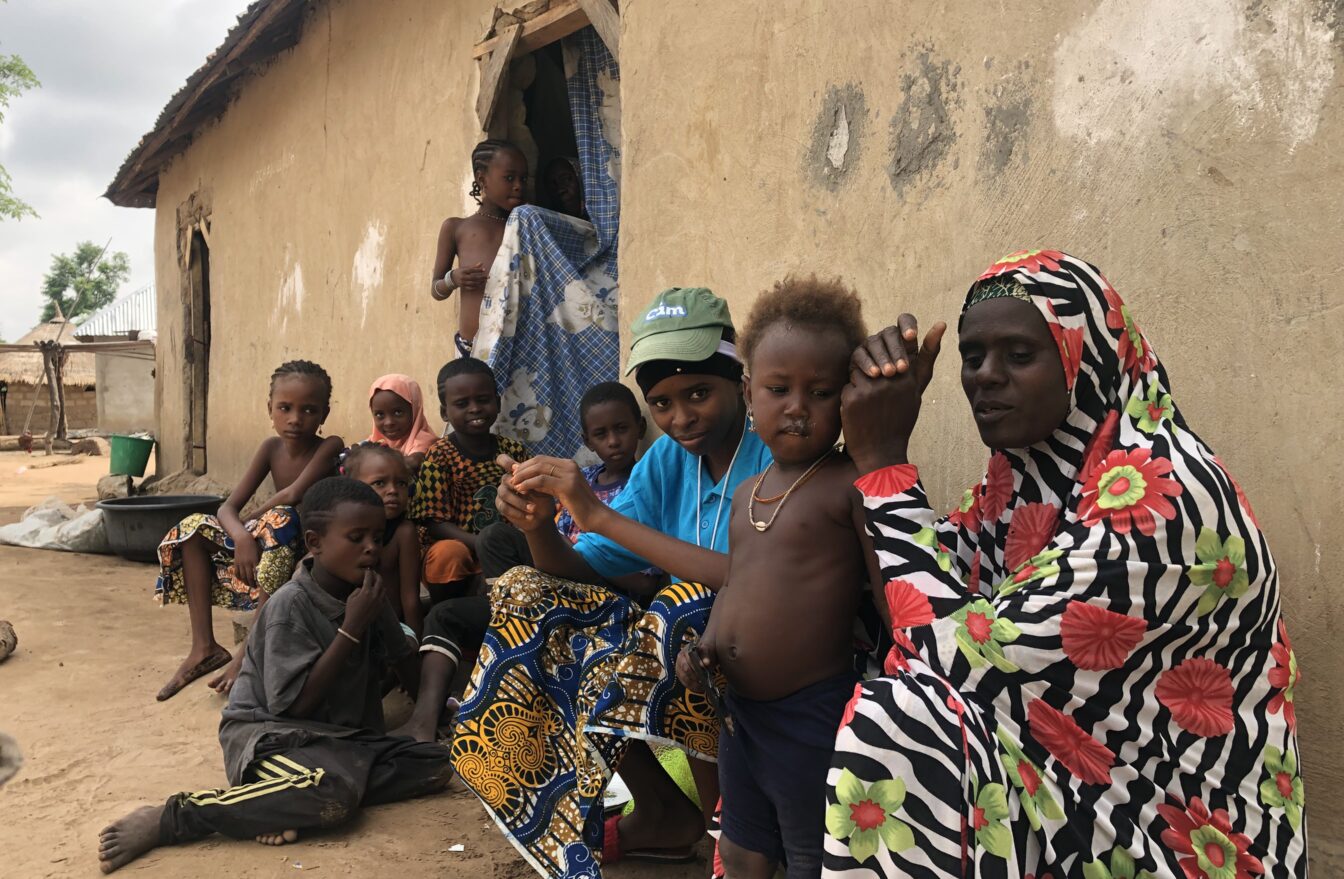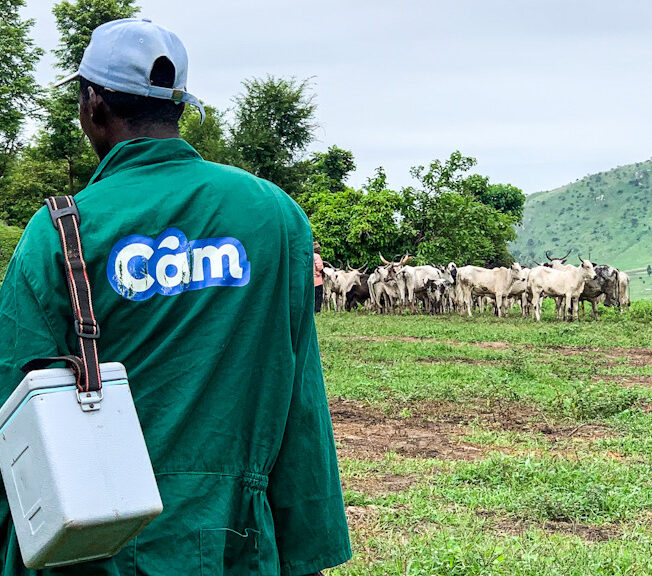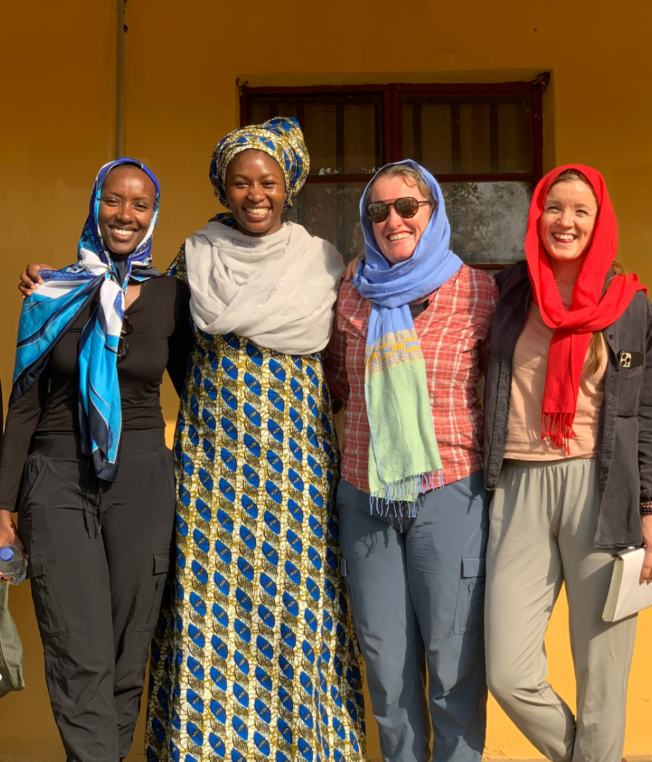The Mastercard Foundation Partnership – The Building Blocks of Câm
How the Mastercard Foundation helped transform the earning potential for pastoralists in Nigeria.

When Câm was created in 2018, we knew the future would be paved with challenges. Just to reach the point where we could launch, we had the ambitious task of building the infrastructure and network to support our business in the first place. This started with developing relationships with our pastoralist communities – the source of all our milk.
It took a long time to build trust with our pastoralists. Even though they’re experts when it comes to cows, most of them are not set up for modern business and don’t even have bank accounts. Whatever technology we introduced to manage the relationship, we needed to help them benefit from the modern economy without impacting on their culture.
We partnered with the Mastercard Foundation to help us solve this challenge.
In October 2018, our application to the Mastercard Foundation’s Innovation Fund was successful. In the months after partnering with the Mastercard Foundation, we made a number of leaps forward. Their support helped accelerate our progress by helping us to fund the development of our own mobile app for data collection and build our supply chain.
We began assembling our field team, who are the main point of contact with our pastoralists. We hired people who are already part of the pastoralist community; one field operations lead, three supervisors and a team of 10 field officers from the Paikon Koré grazing reserve in Gwagwalada, Abuja. Two of these hires are women – the first in the community to pursue employment outside their households.
“We are very glad about [Câm employing women]. Our children stay out of trouble if they have something to do. They take care of themselves and even help their parents. Employing a young woman really helps women and society at large. This will make others parents want to send their children to school, so it’s a good development.”
– Hajara Hashimu, mother of one of Câm’s first female field officers, Harira. [Quote translated from Fulfulde].
The problem was finding people with the appropriate skills and education. So, to continue recruiting and creating jobs in these rural areas, we started developing on the job training programs to improve basic skills and raise the standard of their general education. This included running programs to educate new field team members on milk safety and hygiene.
Finally, Câm has supported the community in creating six government registered cooperatives made up of 112 pastoralists. To date, 64% of our pastoralists are women – we’re incredibly proud of this achievement. Read more about how we’re promoting gender equality and amplifying women’s voices in pastoralist communities.
“We’re passionate about gender equality and amplifying women’s voices in pastoralist communities. When we began assembling our field team, who are the main point of contact with our pastoralists, we decided to create job opportunities within the pastoralist community. We hired two women, who were the first in the community to pursue employment outside their households.”
– Aisha Bashir, Founder of Câm
The ins and outs of setting up electronic payment systems.
Right from the start, we worked with one of our banking partners to open bank accounts for all our pastoralist suppliers. The first thing we realised was that it would be difficult to meet banking KYC requirements. We needed to ensure each pastoralist had a unique mobile number that they had access to at all times. Although they did not have physical addresses, we were able to use the Grazing Reserve location as their residential address.
This has been an ongoing initiative. Although we have experienced teething issues with electronic payments, we’re currently working with our banking partners to create a more effective digital payment system. Our aim is to overcome challenges around high charges for withdrawals and poor network connectivity. In the meantime, we have reverted to cash payments, but we’re confident about transitioning to electronic transfers in the near future.
To understand the needs of pastoralist communities, we collected demographic, income and milk supply data and conducted surveys to understand the spending habits of pastoralists and their needs for feed and fodder.
These insights highlighted a number of wrong assumptions.
Although we were aware of traditional gender norms, we didn’t fully appreciate the impact that increasing the number of female suppliers would have on household dynamics. In Fulani pastoralist tradition, the man owns the cow, and the woman owns the milk. This cultural separation of duties suited our goals because paying the women for their milk would not disrupt this tradition.
However, the men started to feel excluded. Since they are responsible for milking the cows, some of them started to limit how much milk the women could sell and earn money from. This learning led us to rethink our model to incorporate the activities of men so that both men and women can benefit from our work on an individual basis.
In addition to social dynamics, we also identified other areas for improvement. For instance, our data collection is managed via a smartphone app. We assumed that pastoralists, like most people in Nigeria, would own a phone and know how to use it. We soon found out that most pastoralists don’t own a smartphone or have access to the internet. So, we have now included training on how to use smartphones and mobile applications for our field team.
To overcome the issue of patchy mobile network coverage in rural areas, we created meeting points and meeting schedules to ensure regular communication between our field officers and pastoralists, along with using WhatsApp and SMS messages. We also supply all our team members in the field with a smartphone and internet data.
The results from our partnership.
In July 2020, our hard work paid off and we launched our pilot in the middle of the pandemic. We still have room for improvement, but we have already increased pastoralist earnings to an average additional daily income of ₦440/$0.92 for selling milk. This is just the start of the impact we hope to make.
“We sell only raw milk now and Câm makes it convenient by delivering payment to us at home. We get our money in bulk unlike before when we were hawking the milk. We sometimes sold on credit when we were hawking but now we get our money paid on the fixed day.”
– Hajara Hashimu, mother of one of Câm’s first female field officers, Harira. [Quote translated from Fulfulde].
We have also created employment opportunities for a younger generation of pastoralists. The feedback we’ve received from their parents has been quite moving. We’re seeing a change in opinion as more pastoralists recognise the value in their children learning new skills and pursuing fulfilling work. Being a Câmpion has now become a badge of honour in the community!
“By paying a fair income and giving pastoralists the opportunity to sell raw milk, we’ve increased their household earnings by ₦440 per day and saved them on average 69 days of work per year. Along with our efforts to promote education and gender equality, we anticipate this having a huge economic and social benefit to these pastoralist communities.”
We’re now partnering with other organisations that share our vision.
As a result of our work, our Founder and CEO, Aisha, was selected to join the prestigious Rainer Arnhold Fellowship of Mulago Foundation. The fellowship program selects 10 leaders every year from around the world with promising poverty solutions and helps them to design and deliver them at scale.
Since then, we’ve established a relationship with the Department of Animal Husbandry Services, Agriculture & Rural Development Secretariat of the Federal Capital Territory (FCT) and partnered to establish a Milk Aggregation Centre in the Paikon Koré Grazing Reserve in Gwagwalada, Abuja.
We also collaborated with Nestlé, 2SCALE, CBi and the Department of Animal Husbandry Services of the FCT to train over 300 pastoralists on milk safety and hygiene, animal health and nutrition and administer vaccines for over 9000 cows.
These changes are just the beginning.
We’re continuing to make micro-improvements based on feedback from our pastoralists, our customers and our Câmpions. We’d like to say thanks to the Mastercard Foundation for their belief, their support and their experience in helping us to create a solid foundation to launch Câm.
– Aisha Bashir, Founder of Câm


